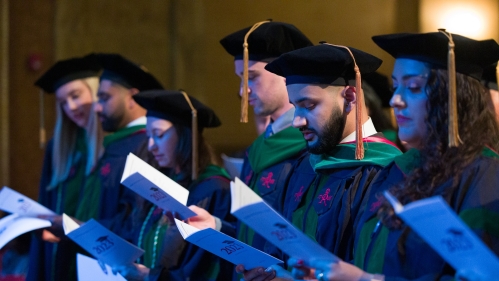
Requirements for Promotion and Graduation
Our curriculum and program requirements ensure our MD students are prepared to make a difference in the medical field when they graduate.
A. Candidates for the degree of Doctor of Medicine must exhibit the requisite attitudes, skills, knowledge and professional behavior to complete the prescribed course of study, and must meet "The Essential Functions for Admission and Matriculation" cited in the catalog of Robert Wood Johnson Medical School. In addition, a candidate must also possess personal qualifications and attributes deemed necessary to perform the duties of a medical professional. Specifically, all candidates are expected to exhibit unimpaired judgment and behavior consistent with the responsibilities of a medical professional. Thus, in addition to the usual academic evaluations for each course, the student evaluation will also take into consideration the following:
- Professional demeanor
- Professional conduct
- Concern for the welfare and dignity of patients
- Concern for the rights of others
- Responsibility to duty
- Trustworthiness
- Honesty
- Ethical conduct
- Aberrant behavior
- General or specific conduct meriting concern
B. Entrance into the second year requires successful completion of the first-year curriculum and compliance with the reporting requirements for the Independent Project. Entrance into the third year requires successful completion of the second-year curriculum and compliance with the reporting requirements for the Independent Project. All students are required to take the United States Medical Licensing Examination (USMLE) Step 1 examination prior to the Introduction to the Clerkship Experience course except with permission of a Dean of Student Affairs. All students are required to pass the USMLE Step 1 exam prior to beginning any clerkship. Prior to beginning required rotations of the fourth year curriculum, students must satisfactorily complete all core clerkships of the third year and satisfy the reporting requirements for the Independent Project. Students who fail to satisfy these requirements will not be permitted to register for the next academic year.
C. Students for whom greater than 2.5 years have elapsed since the completion of the second year Patient-Centered Medicine course must satisfy the following requirements prior to entry into the third year:
- Students must take a six week "practice clerkship" in medicine or family medicine, at least 50 percent of which shall be in an inpatient setting, immediately prior to entry into the third-year curriculum. The activities of the "practice clerkship" will conform to a standard clerkship except that no written exam will be given, no credit will be given, and no grade will be entered on the transcript. The student will, however, be given evaluative feedback. This requirement will be waived for students in an MD/PhD program that includes regular clinical experiences during the PhD phase.
- Students must take Introduction to the Clerkship Experience prior to taking the first clerkship or elective for credit.
- For MD/PhD students, all work for the PhD (including thesis defense and revisions) must be completed prior to starting the "practice clerkship," if a “practice clerkship” is required, or the first clerkship for credit, if a “practice clerkship” is not required.
D. All students must pass the Summative Clinical Skills Assessment, complete the Clinical Procedures Requirement, and complete the Independent Scholarly Project.
E. Successful completion of 16 weeks of electives are required for graduation. All electives in which a student enrolls must be passed. In certain cases, the MD degree may be awarded after the university commencement, once the student successfully completes all requirements.
- Students who are in the MD/PhD program and have completed all course and research requirements for the PhD (as certified by the thesis advisor) will be allowed to substitute the PhD training for up to 16 weeks of electives.
- Students who are in the MD/PhD program or the MD/MBA program and have completed all requirements for the MPH or MBA (as certified by the program director) will be allowed to substitute previously taken health care related courses, as approved by a Dean of SA, for up to 12 weeks of electives.
- Students who are in the MD/MSCTS program and have completed all requirements for the MSCTS (as certified by the program director) will be allowed to substitute health care-related courses for up to 12 weeks of elective credit as approved by a Dean of Student Affairs.
- Students engaged in Student Scholar activity (approved by a Dean of Student Affairs) after completion of the pre-clerkship curriculum may receive up to eight weeks of elective credit. In order to receive credit, students must submit an approved Individually Designed Elective form to the Office of the Registrar prior to beginning this activity.
- Students who complete masters or doctoral programs at other universities while enrolled at Robert Wood Johnson Medical School may receive up to 12 weeks of elective credit for work done toward a masters degree and 16 weeks of elective credit for work done toward a doctoral degree with approval of the Dean of Student Affairs. These credits will be awarded for health sciences-related courses as determined by a Dean of Student Affairs.
F. All students must successfully complete the full third- and fourth-year curricula and pass the USMLE Step 2 Clinical Knowledge and Step 2 Clinical Skills exams prior to being awarded the MD degree.
Technical Standards
In addition to the requirements outlined above, all students must also satisfy the Technical Standards for Admission and Matriculation for Robert Wood Johnson Medical School, which outline the nonacademic skills necessary to provide safe and effective patient care.
